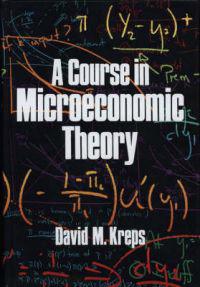Game Theory And Economic Modelling (Pocket)
avDavid M. Kreps
ISBN: 9780198283812 - UTGIVEN: 1990-10-04The advent of noncooperative game theory over the past two decades has brought about a mild revolution in economics. This book presents an accessible, non-technical discussion of the basic concepts from noncooperative theory, and explores the strengths, weaknesses, and future of the theory as a tool[...]
Microeconomics for Managers (Inbunden)
avDavid M. Kreps
ISBN: 9780393976786 - UTGIVEN: 2003-10Developed over the course of ten years at the Stanford Business School, Microeconomics for Managers leads the field with a strong game theoretic approach and full-chapter coverage of many modern topics, including Porter s five forces, signaling, transaction costs, and incentives."[...]
Microeconomics for Managers (Pocket)
avDavid M. Kreps
ISBN: 9780393976793 - UTGIVEN: 2003-12Supplements the textbook Microeconomics for Managers.
Strategic Human Resources: Frameworks for General Managers (Inbunden)
avJames N. Baron, David M. Kreps
ISBN: 9780471072539 - UTGIVEN: 1999-03-31Human Resources are the most important resource that a firm commands and should be regarded as capital, a factor of production in which managers invest today in order to realize future profits.[...]
A Course in Microeconomic Theory (Inbunden)
avDavid M. Kreps
ISBN: 9780691042640 - UTGIVEN: 1990-03David M. Kreps has developed a text in microeconomics that is both challenging and "user-friendly." The work is designed for the first-year graduate microeconomic theory course and is accessible to advanced undergraduates as well. Placing unusual emphasis on modern noncooperative game theory, it pro[...]
Microeconomic Foundations I (Inbunden)
avDavid M. Kreps
ISBN: 9780691155838 - UTGIVEN: 201210"Microeconomic Foundations I" develops the choice, price, and general equilibrium theory topics typically found in first-year theory sequences, but in deeper and more complete mathematical form than most standard texts provide. The objective is to take the reader from acquaintance with these foundat[...]
A Course In Microeconomic Theory (Pocket)
avDavid M. Kreps
ISBN: 9780745007625 - UTGIVEN: 1990-03-01Notes on the Theory of Choice (Pocket)
avDavid M. Kreps
ISBN: 9780813375533 - UTGIVEN: 1988-05In this book, Professor Kreps presents a first course on the basic models of choice theory that underlie much of economic theory. This course, taught for several years at the Graduate School of Business, Stanford University, gives the student an introduction to the axiomatic method of economic analy[...]










